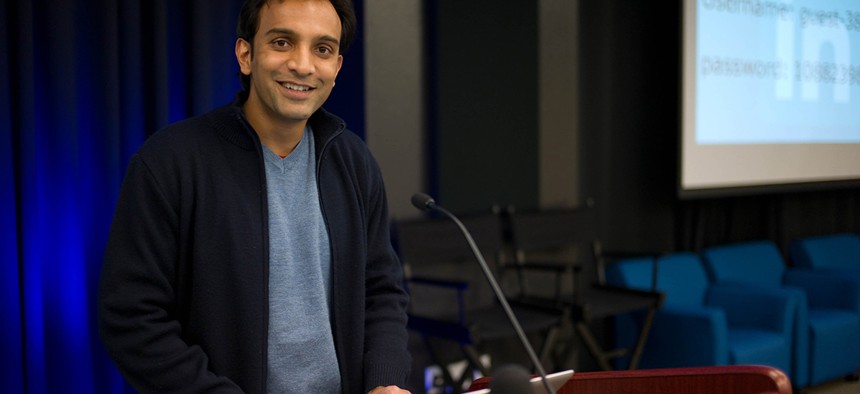White House Data Scientist: Even Slackers Can Make It To the Top

White House Chief Data Scientist DJ Patil Flickr user Joi Ito
Despite a lack of focus early on—he "barely graduated from high school," he says—DJ Patil has had a long career in data science.
White House Chief Data Scientist DJ Patil started out as an underachieving high schooler who was bad at math, he revealed during a recent Q&A on answer crowdsourcing site Quora.
Patil, named chief data scientist last February, also told readers this week the government is increasingly interested in data; today, at least 25 top government leaders are focused on it fulltime.
In Patil's tenure, he's worked on projects including the Precision Medicine Initiative, which seeks to invest in technology that could tailor medical treatment to an individual patient's genetic makeup and lifestyle; a series of workshops exploring potential uses for artificial intelligence in government; and research into the impact of big data techniques on citizens' civil rights.
» Get the best federal technology news and ideas delivered right to your inbox. Sign up here.
Despite a lack of focus early on—he "barely graduated from high school," he wrote—Patil has had a long career in data science. He joined the White House after serving as vice president of product at customer relationship management software startup RelateIQ, acquired by Salesforce. He also worked at tech companies including LinkedIn, eBay and Skype.
Here are a few takeaways from the Q&A session:
1. The White House chief data scientist still works with data, even though his main priority is policy.
In the top data spot, Patil's primary mission is to "responsibly unleash the power of data to benefit all Americans," he wrote—meaning, his office focuses on "rules, projects, legislation, etc." that can promote its use in government.
But as a trained data scientist, he still does some number crunching.
"When I’m looking at data for the first time, I just like to look at the data to get a sense on order of magnitude, variability, text, etc.," he wrote. "Then, I like to conduct lots and lots of histograms. This helps me start thinking about interesting questions to ask."
He recommended data scientists starting today should know the python and R programming languages.
2. Citizens interested in data but who lack technical skills can still pick them up
Asked what courses Patil would recommend for beginners, he noted while there are online training classes and coding bootcamps, he learned "by getting interested and excited about a project. Then, you’re focused on solving a problem rather than just applying tools/techniques."
Patil suggested exploring Data.gov, where federal open data sets are stored, to "find something you're [interested] in playing with," going to hackathons.
For citizens interested in improving the public good, he recommended starting with datasets on traffic fatalities from the Transportation Department.
"We need everyone to study it to help figure out what we should do from a policy perspective," Patil wrote; he also pointed to data related to precision medicine, cancer and police activity.
3. All data science classes should have ethics training
The White House recently released a report on big data and civil rights, including how data analytic techniques could potentially discriminate against some populations.
"This is one of the biggest things that I’m concerned about today," Patil wrote. "EVERY data science, computer science, stats, econ, or other class using data, must have ethics as a central part of their curriculum. Just because we can with data doesn’t mean we should."
4. Even underachievers can eventually make it to the White House.
In high school, Patil wrote, "I was about as underachieving as you could get. Barely graduated from high school. Suspended, arrested, etc."
During a commencement speech he delivered at the University of Maryland a few years ago, Patil attributed his success to putting himself in challenging, and often uncomfortable situations.
"While growing up in California, to simply say I was bad at math would have been an understatement," he said in a transcript of the speech. "My freshman year of high school, I was kicked out of my algebra class and had to spend the summer retaking it."
A college calculus class changed his trajectory. He checked out some high school math books and "[s]uddenly, I was failing at a problem, figuring out what I did wrong, and then course correcting. This feeling of being able to iterate was very new to me."
He became a math major, and went to the University of Maryland for his graduate study, where "I got my ass kicked by everyone, again," he said in that speech. "I failed my first graduate class and even got the second lowest scores on my first Ph.D. qualifying exam. (The lowest score was actually by a guy who didn’t even show up.) I really, really wanted to quit, but that wouldn’t be the uncomfortable path."
Patil then got the highest scores in the next set of qualifying exams, he wrote.





